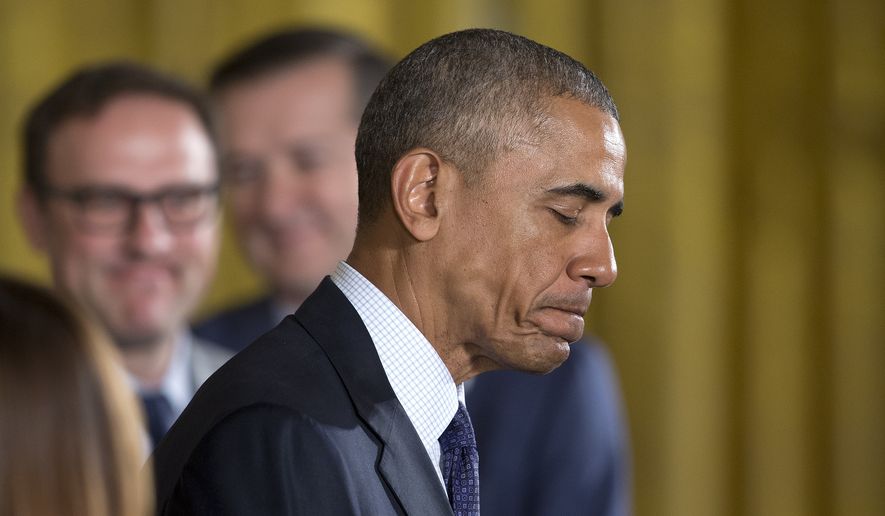OPINION:
Barack Obama vowed to transform America, and he succeeded. After his two terms in the White House, the day-to-day lives of Americans are very different from what they were. If religious faith and politics are important to the feelings of well-being, the Age of Obama has pushed the nation backward. Transformation can be good, and it can be bad, depending on who’s transforming what.
A new Pew Research Center study, “How America Changed During Barack Obama’s Presidency,” reflects a nation a little worse for wear after eight years of Mr. Obama’s “hope and change.” Says the Pew conclusions: “Partisan divisions in assessments of presidential performance … are wider now than at any point going back more than six decades, and this growing gap is largely the result of increasing disapproval of the chief executive from the opposition party.”
An average of 81 percent of Democrats approved of Mr. Obama’s leadership over the years, but Republican approval measured only 19 percent, and Republicans are people, too. With 85 percent of Republicans opposed to the president’s signature accomplishment, it’s no surprise that the Republican-controlled Congress is ready to trash the 2,700 pages of the health-care scheme. Nancy Pelosi, the leader of the Democrats in the House, says Congress had to enact those 2,700 pages into law to see what was in them. The people saw, and acted accordingly.
The Democrats have argued that white opposition to the nation’s first black president has been the source of the wide discontent — meaning, if you don’t like Mr. Obama’s agenda, you’re a racist and a bigot — but it was calumny that almost nobody bought. Exit polls revealed that it was white Americans, armed with goodwill, who twice elected him. Similarly, the recent take-no-prisoners battle between Hillary Clinton and Donald Trump was frequently portrayed as a war of men vs. women. The liberals are still trying to sell that notion, and thousands of angry women will march on Washington following Friday’s inauguration in hopes of establishing themselves as a “permanent opposition.”
Christians and Jews have seen a growing challenge from the left to their legitimacy as citizens during the Obama years. “Those who self-identify as atheists or agnostics, as well as those who say their religion is ’nothing in particular,’ now make up nearly a quarter of the U.S. adult population, up from 16 percent in 2007,” the Pew survey observes. Christians, still the large majority of the U.S. electorate, have nevertheless declined from 78 percent of the population to 71 percent.
The secularization of America is an incidental element of what’s happening, but for Mr. Obama it’s a decline he’s proud of. “For we know that our patchwork heritage is a strength, not a weakness,” he said at his first inaugural eight years ago. “We are a nation of Christians and Muslims, Jews and Hindus — and non-believers.” Eight years later, his U.S. Commission on Civil Rights boldly stated that “the phrases ’religious liberty’ and ’religious freedom’ will stand for nothing except hypocrisy so long as they remain code words for discrimination, intolerance, racism, sexism, homophobia, Islamophobia or any form of intolerance.” The full-throated current condemnation of believers and their values is a fitting symbol of transformation, Obama-style.
Politics and religion are often explosive in presentation, and Barack Obama’s transformative presidency has rubbed many voters the wrong way. While Mr. Obama’s personal approval rating has climbed to 58 percent as he steps from the national stage into history, 61 percent of Americans still believe the country is on the wrong track (Reuters/Ipsos poll). Whether unhealthy trends persist during the Trump presidency is a question both crucial and urgent. There’s hope at last for positive change.




Please read our comment policy before commenting.